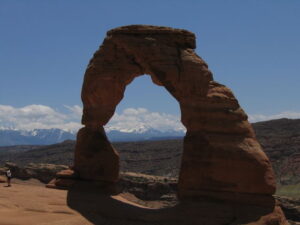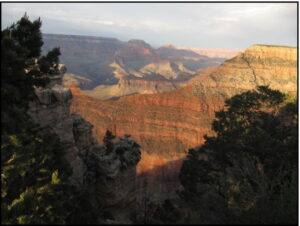 The National Park System in the Western United States provides a unique opportunity for us to examine how geological processes shape the Earth. In the course, we will travel to different National Parks in Arizona, and Utah to develop an understanding of basic geological processes. In essence, we will be able to study many of the topics covered in an intro-geology course, but do so with an experiential field course instead of the traditional semester lecture-lab model. For example, in the Canyonlands we will be able to examine processes of sedimentation, igneous intrusion and erosion. We will consider the record of life on Earth by examining the fossil record preserved in the rocks. And various locations will give us the opportunity to discuss natural hazards like volcanism (Sunset Crater) and global catastrophes like impact events (Meteor Crater). The course will begin with two days of intensive study at Lafayette, learning basic geologic concepts and earth materials. We will then begin a circuit of the following parks: Grand Canyon, Zion, Bryce, Grand Staircase of the Escalante, Capitol Reef, Arches, Canyonlands, Goosenecks of the San Juan, Monument Valley, Sunset Crater and Meteor Crater. The trip will include a three-day rafting trip on the Colorado River into Grand Canyon National Park that concludes with a hike out of the Canyon through 1.8 billion years of Earth history.
The National Park System in the Western United States provides a unique opportunity for us to examine how geological processes shape the Earth. In the course, we will travel to different National Parks in Arizona, and Utah to develop an understanding of basic geological processes. In essence, we will be able to study many of the topics covered in an intro-geology course, but do so with an experiential field course instead of the traditional semester lecture-lab model. For example, in the Canyonlands we will be able to examine processes of sedimentation, igneous intrusion and erosion. We will consider the record of life on Earth by examining the fossil record preserved in the rocks. And various locations will give us the opportunity to discuss natural hazards like volcanism (Sunset Crater) and global catastrophes like impact events (Meteor Crater). The course will begin with two days of intensive study at Lafayette, learning basic geologic concepts and earth materials. We will then begin a circuit of the following parks: Grand Canyon, Zion, Bryce, Grand Staircase of the Escalante, Capitol Reef, Arches, Canyonlands, Goosenecks of the San Juan, Monument Valley, Sunset Crater and Meteor Crater. The trip will include a three-day rafting trip on the Colorado River into Grand Canyon National Park that concludes with a hike out of the Canyon through 1.8 billion years of Earth history.
Course Objectives
- Develop a fundamental understanding of geologic processes and time.

- Understand how geologic processes act to create landscapes
- mountain-building processes create highlands,
- while geomorphic process subsequently reshape the landscape
- Relate active processes to the types of sediments and rock types that we observe
- Develop a sense of geologic time by an examination of how both slow and fast geologic processes reshape the landscape over millions of years.
